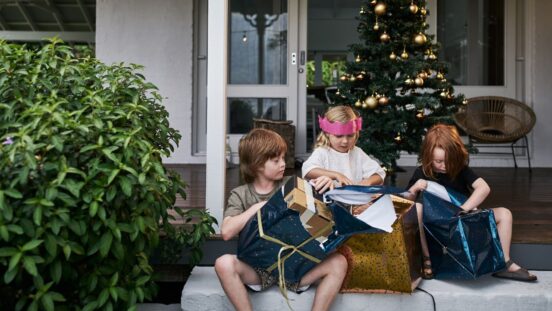Surrogacy in Australia: Myths and misconceptions
Chrissy Teigen joins the ranks of celebrities who have welcomed babies via surrogates.
Chrissy Teigen has welcomed a son, Wren Alexander, via surrogate just months after giving birth to her daughter Esti following IVF. She joins the ranks of celebrities who have had babies via surrogacy, which include Khloe Kardashian, Hilaria Baldwin and Rebel Wilson.
In April 2023, Heath Curry and terminally ill Toni Hilland (Amazing Race) welcomed a daughter via surrogate.
“She’s here!!! Introducing Amelia Hope Curry, born on the 5th of April 
When Toni and Heath won the 2022 season of The Amazing Race, Toni had already been diagnosed with terminal breast cancer. The couple had to give up IVF with her diagnosis but they had one embryo left – and a friend offered to carry it for them: “…but out of the blue we had the most beautiful, selfless, kind offer from a friend to be our surrogate 
It’s important to note that surrogacy in the US is not governed by federal laws so traditional and commercial surrogacy works on a state-by-state basis.

Chrissy Teigen’s surrogate Alexandra has given birth to Chrissy’s son, Wren Alexander.
Surrogacy in Australia
Altruistic surrogacy is possible in Australia, but as it’s regulated by various state-based laws, navigating this form of assisted reproductive technology (ART) can be challenging.
Fertility Specialist from Melbourne IVF, Dr Chandrika Parmar, sheds light on the top five most commonly held surrogacy myths.
“Being a fertility specialist, I’m honoured to help my patients and support them through their conception journey, and sometimes that means guiding them through surrogacy discussions and understanding legislation. Being able to help complete a family through surrogacy is a really special part of my job; the gift of surrogacy really is life-changing for families,” says Dr Chandrika Parmar.
Top five most commonly held surrogacy myths
1. Surrogacy isn’t possible in Australia – MYTH
Surrogacy is a complex process but it’s definitely possible in Australia. There are particular laws and approvals that must be followed.
In Victoria, the surrogate must have previously carried and given birth to a live child. We at Melbourne IVF also prefer that the surrogate’s baby be at least 12 months old before embarking on the surrogate journey, that the surrogate is at least 25 years old, and that the surrogate’s eggs not be used in the child’s conception (i.e., the surrogate will not be genetically linked to the child carried for the intending parents).
Each surrogate must also be examined by an impartial doctor to ensure that it is safe for them to have another pregnancy and that there are no risks involved.

Rebel Wilson says her daughter, Royce Lillian, born by surrogate in early November 2022, is a “beautiful miracle”. Rebel’s partner is fashion designer Ramona Agruma.
2. Surrogacy in Australia is allowed when there is no medical reason – MYTH
Surrogacy in Australia is only used as a medical response when someone is unable to have their own child and cannot carry a pregnancy.
Under Victorian law, a person may use a surrogate if they are unlikely to become pregnant, unable to carry a child, or are likely to endanger their own or their child’s life or health if they become pregnant.
The medical guidelines for surrogacy include the absence of the uterus, abnormalities in the uterus that make pregnancy unsafe, or other medical conditions, like having cancer or having treatment for it, that make pregnancy too dangerous. It can also be an option for LGBTQ+ people who require a surrogate to help them have a child.
With the exception of the ACT which only permits gestational surrogacy, both gestational and traditional surrogacy are legal in all states and territories in Australia.
Gestational surrogacy involves transferring an embryo created with the intended parent’s or donor’s egg and sperm into the surrogate’s uterus. In these cases, the surrogate has no genetic connection to the child.
Traditional surrogacy involves a surrogate conceiving with her own eggs, with sperm from an intended father or a donor.

In August 2022, Khloe Kardashian and her ex-boyfriend Tristan Thompson welcomed their second child together via surrogate. The couple have a four-year-old daughter, True.
3. In Australia, you can pay a surrogate – MYTH
In Australia, it takes a unique individual to become a surrogate, as they cannot be compensated for their services. However, the surrogate may be compensated for medical expenditures and bills.
4. It’s legal for a woman to advertise that she’s willing to be a surrogate – MYTH
Women wanting to be a surrogate cannot publicly indicate willingness to act as a surrogate. Mostly, a surrogate is someone who is known to the intended parents. This enhances the uniqueness of the whole process.
5. Fertility clinics can’t help with surrogacy – MYTH
Surrogacy assistance and programs are offered by fertility clinics. Melbourne IVF’s program offers counselling throughout the process so that not only the individual or couple seeking surrogacy but also the surrogate and their partners, if any, are counselled and supported. If the surrogate has children, a therapist will explain the entire procedure to the children if they are old enough.




